Self-Care Tips
By Jemima Shafei-Ongu, Psychologist (CAPS)
Most of us have come across the term ‘self-care’ and while it may conjure up images of face masks and bubble baths, (often fuelled by commercial consumer culture), self-care is actually the act of meeting your needs by becoming more in tune with what your mind and body needs; and deliberately making time for this.
There are several ways we can do intentional acts of selfcare
(and they’re not just relaxing and indulging).
Below, you’ll find our top 7 self-care tips.
Feel free to try these out or investigate further
and add them to your tool box of tips for looking after yourself.
Breathe
Did you know that diaphragmatic breathing (also known as belly breathing) can activate our brain’s calming response?
By stretching our diaphragm (the dome-shaped muscle under our lungs) we activate the brain’s vagus nerve which is involved in reducing stress and anxiety.
Try this: Lie down with your hands resting on your belly. Image your belly as the base part of a balloon which is filled (has expanded) with air. Start by exhaling, and as you do, imagine emptying your abdomen of air as your hands gently squeeze your abdomen – flattening it to the floor (or mattress). Keep your chest and shoulders relaxed. Once you’re out of air, hold for a couple of seconds (squeezing those abdominal muscles in), before relaxing your belly and allowing it to naturally fill with air. Repeat, by slowing down the out-breath a little more the next time, if you can. Continue for a few breaths until you feel a sense of peace and calm. Eventually you can try this sitting upright in a chair.
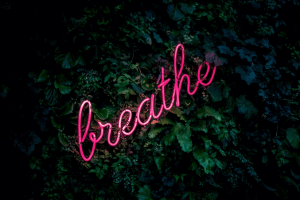
Practice Being Present
Did you know that the neurons involved in reengaging our brain when we feel dysregulated have to do with our ability to become present? Often referred to as mindfulness, engaging your senses in everyday activities such as noticing what each of your senses is doing without judgement, with open-ness, awareness, curiosity, and pure presence helps strengthen mindfulness skills and keep you calm and regulated. With practice, you are more likely to access this skill during times of distress, making it easier to manage difficult thoughts and feelings; in order to do things that matter to you – sooner.
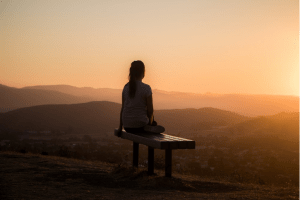
Try bringing your attention to the present moment by engaging your senses in day to day activities such as making a cup of tea, or watering your plants. If your mind wanders (as most of ours do), the act of noticing that it has, and bringing it back (time and time again) IS the practice of mindfulness. Try to see the distractions (especially thoughts that ‘hook you in’) as the necessary ‘gym equipment’ of your (mindful) workout session!
Meditation is a formalised practice of mindfulness. You might like to try using an app such as Smiling Mind or Headspace on a regular basis to practice mediation. Start with one minute a few times a week.
Speak kindly to yourself
Did you know the way you talk to yourself has an impact on your mental health? All of us talk to ourselves, a lot of the time. Having thoughts is part of this self-talk. Noticing what and how we say things, as well as the way we say them, is a first step in developing self-compassion. Try speaking the way you would to a loved friend during moments of distress. Go ahead, soften the tone of your self-talk, and try speaking kindly to yourself the next time you (catch yourself) saying something critical to yourself.

You might like to try a pre-recorded compassion meditation. Here’s a link to a six minute Loving Kindness Meditation that you might like: Guided Meditation | Loving Kindness for Self Compassion
Engage in Enjoyable Activities
Do something playful or creative such as dance, paint, draw or sing; or make something using your hands. Creativity is as important to our self-development (growth and learning) as is any other (formal) learning such as learning to read! Give yourself permission to play and make mistakes and release yourself from the notion that the product has to be ‘good’.
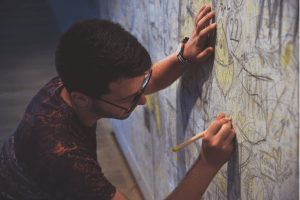
It is an experience that was once your child-self’s natural way of being in the world, which may have been crowded out of a lifestyle by our familial, educational, social or economic environments and expectations. Don’t believe us? Think of the creative things you did as a child that brought you joy and the last time you engaged in them. You might like to hear Sir Ken Robbins give a talk from 2006 that highlights the importance of creativity and its role in education. Do Schools Kill Creativity? | Sir Ken Robinson

Stretch
Did you know that stretching can increase our distress tolerance?
Initially, stretching can be uncomfortable, but as we learn to do it safely, with a sense of openness and awareness we build muscle in our brain to distress tolerance, which transfers to other areas of distress in our lives. Furthermore, stretching releases tension in our bodies – a common phenomena due to our increased use of electronic screens; and also protects our bodies from future injuries.
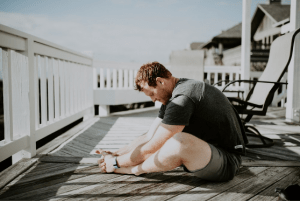
For a 15 minute routine, you could try this: 15 Minute Beginner Stretch Flexibility Routine by Tom Merrick
If you’re interested in learning more about the power of moving your body for better mental health, see The Joy of Movement by Prof Kelly McGonigal – Health Psychologist.
Exercise
Did you know that exercise is not just good for your physical health and fitness but it’s a great way to deal with stress?
Stressors are things we often don’t have much control over, like the amount of work we have to do, or our responsibilities to our family or even commuting in traffic. While our body’s response to stressors often includes the activation of our body’s natural ‘stress cycle’ (which includes the release of stress hormones such as cortisol and adrenaline), something as simple as doing star jumps when you’re feeling stressed or going for a vigorous walk in response to this bodily reaction, helps to restore a sense of safety to your body.
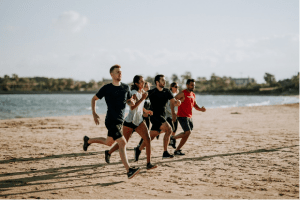
If you’re interested in learning more about why stress and burnout is not always relieved by relaxing and what is commercially promoted as self-care, see: The Cure to Burnout (hint: it isn’t self-care) The cure to burnout (hint: it isn’t self-care)
Connect
We are communal beings! The impact of COVID’s isolation highlighted just how critical connection with one another and with nature was to our sense of wellbeing.
Reach out to friends for a coffee catch up or a good laugh, ask for help when you need it from someone who can hold the space for you to be vulnerable.

Connect with your pet: studies show that patting your pet can help reduce stress levels, calm your mind and improve blood pressure.
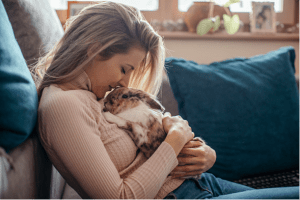
Connect with nature: Spending time in your garden with plants has the added benefit of moving and caring for something external to yourself. Furthermore spending time with nature has been proven to reduce stress, Forest bathing – a practice which simply asks people to spend time in nature (no bathing necessary) has been shown to reduce stress levels, reduce blood pressure levels and improve heart health.

Find out more about forest bathing here: Japanese nature therapy: A beginner’s guide to forest bathing
Remember you can always reach out to the UNE’s Wellness Centre on 02 6773 2897 if you would like to discuss these suggestions further. Alternatively, you can seek professional help externally by speaking with your GP or a support hotline such as:
Beyond Blue
Ph 1300 22 4636
Web https://www.beyondblue.org.au/
Lifeline
Ph 13 11 14
Web https://www.lifeline.org.au/
Kids Helpline (up to age 25)
Ph 1800 55 1800
If you’d like a fun and easy read for more things you can do, see Me Time: the self-care guide to being your own best friend by Jessica Sanders

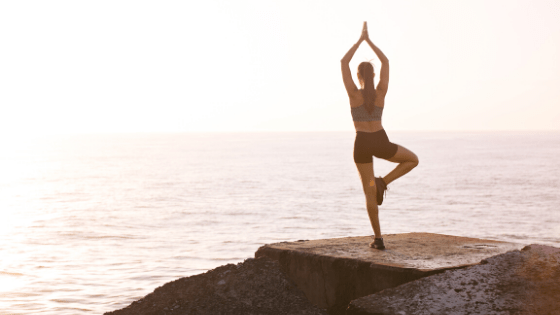



You must be logged in to post a comment.